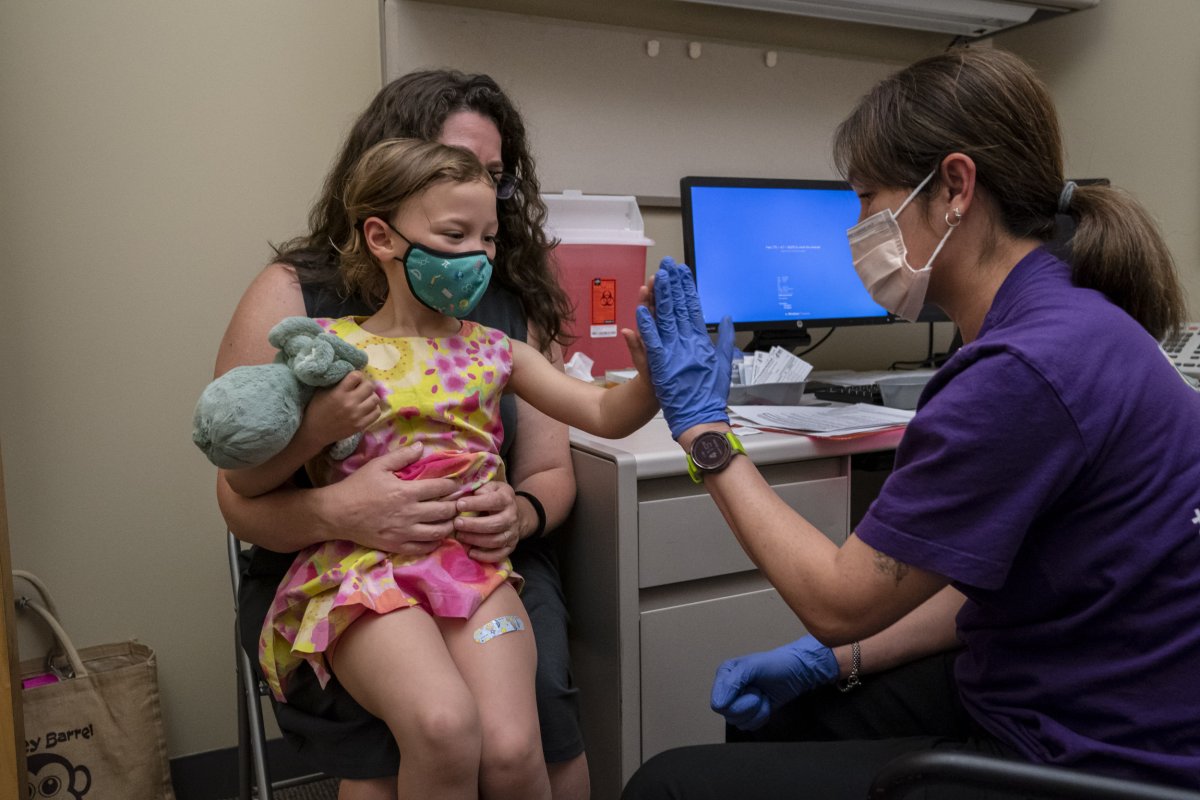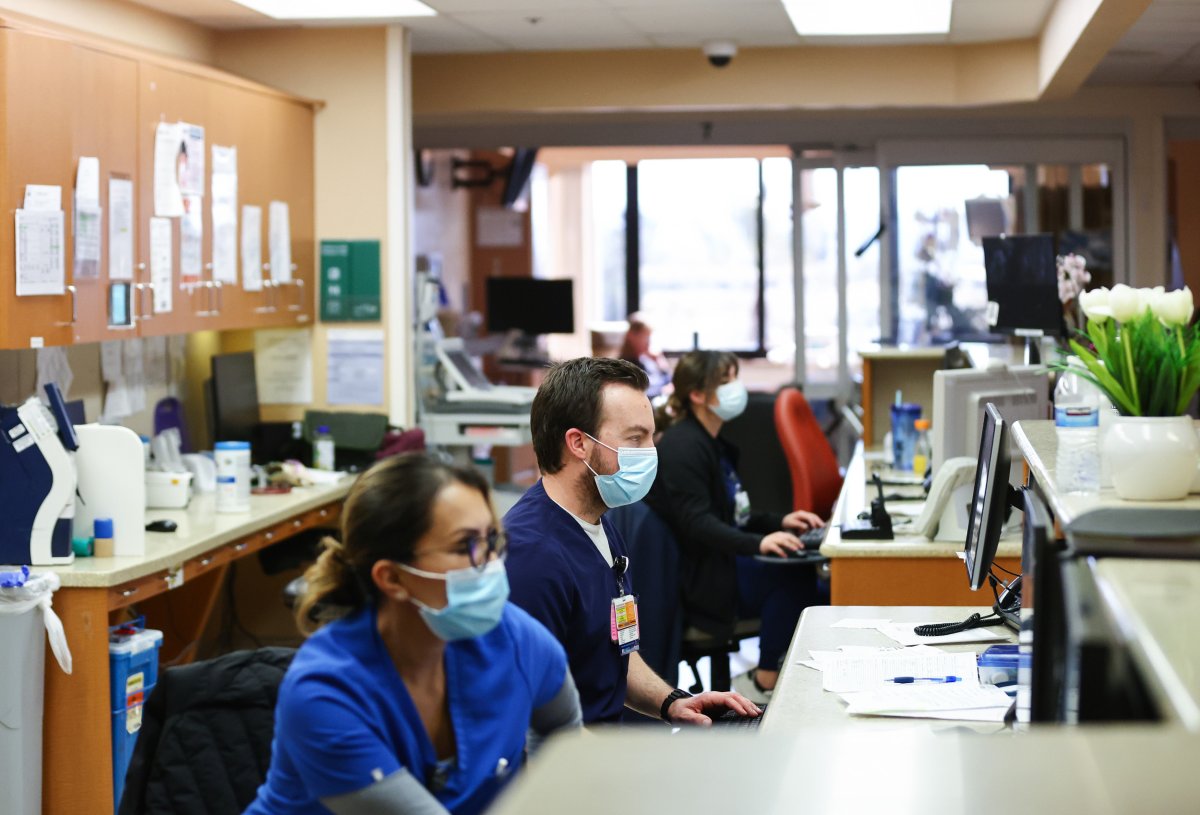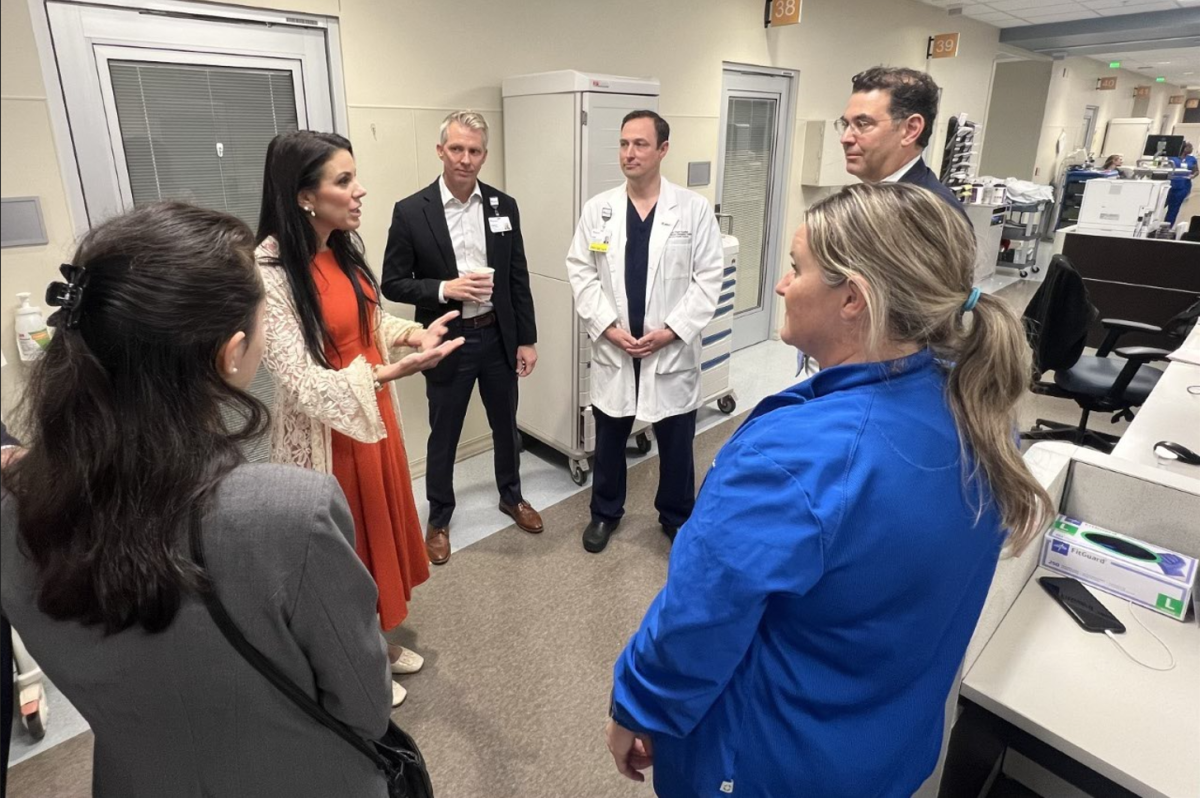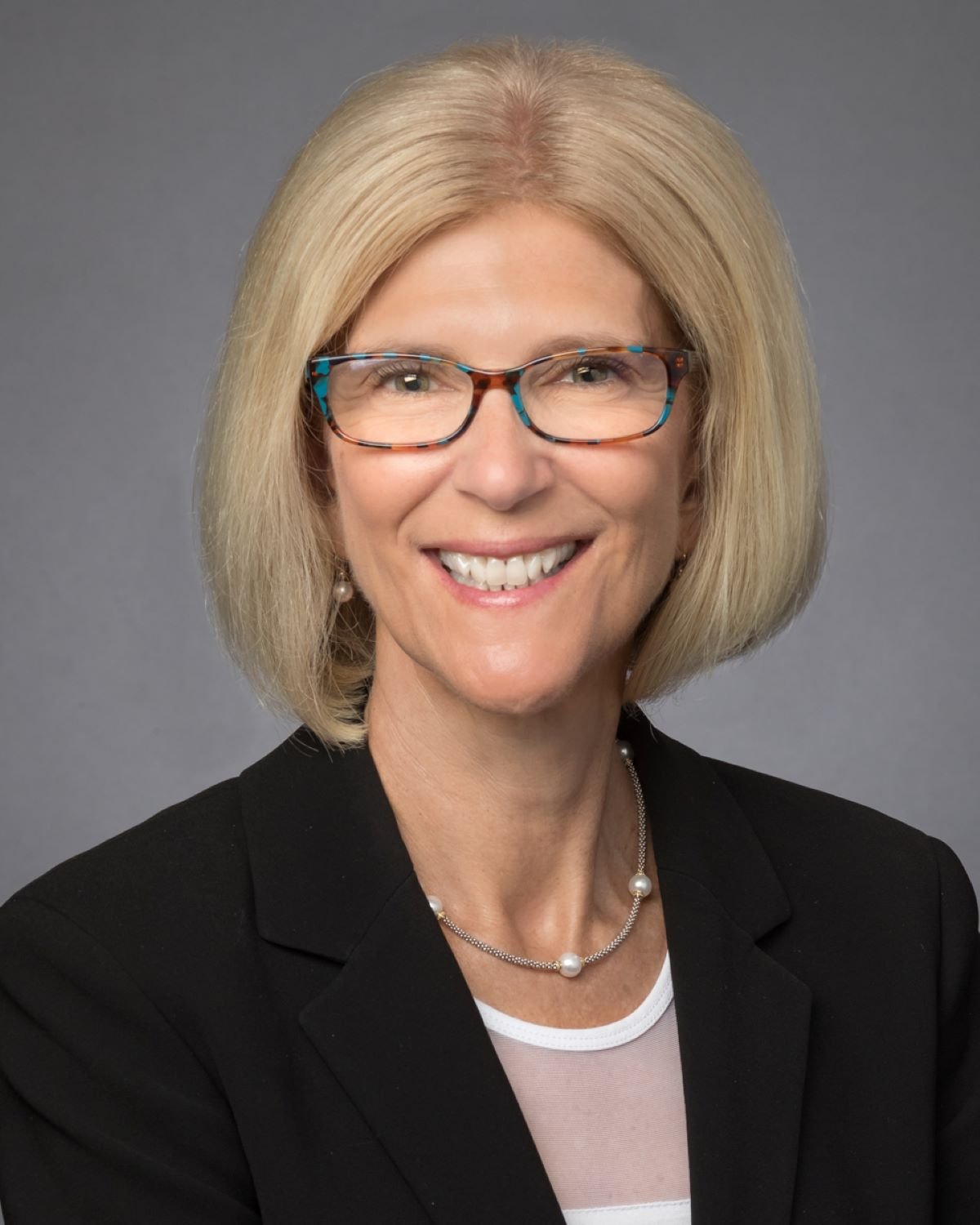When Roxanna Gapstur started working as an oncology nurse, she wasn't looking to rise in the ranks.
"I was taking care of cancer patients and eventually I moved into leadership just really serendipitously," she told Newsweek. "It wasn't anything specific that I was searching for, but I was asked to do more in particular roles that I had and eventually became really excited about leading and being able to influence the lives of more than one patient at a time."
She continued to advance into leadership roles in both hospital operations and across the health system for over 25 years and eventually became the senior vice president of a large integrated health system in the Midwest.
In 2019, she took on the role of CEO at WellSpan Health, an integrated health system serving central Pennsylvania. She said her experience nursing has prepared her for leadership because she was able to bring processes to care for patients at every level.
"I know what challenges there are taking care of patients [and] what our team members are facing in different parts of the organization," she said. "I think what it means to me to be a good leader is that you're continuously learning, continuously trying to improve the organization that you're leading, and that you're doing that from a place of integrity and authenticity."

While Gapstur's passion is common among women working in health care, her journey is not. Even though it is a field largely dominated by women, executive leadership in health care is primarily comprised of men.
According to McKinsey & Company's Women in the Workplace 2022 report, female employees continue to represent most of the health care industry but drop off as they move up the corporate ladder.
The study finds that health care "continues to outpace other industries" in the representation of women in lower and mid-level positions. Women, however, remain largely underrepresented at senior levels. Women make up 75 percent of the workforce at the entry level but only 32 percent at the C-suite level, according to McKinsey. And those women who are at senior-level roles are predominately white women. Only 4 percent of C-suite health care executives are women of color, according to McKinsey.
"After almost over 40 years [in the health care industry], it still is a disappointment to me that [women] disappear as we get to the top," said Cathy Jacobson, the CEO of Froedtert ThedaCare Health, Inc., a regional health care system based in Milwaukee.
The study also found that women in health care are leaving their jobs at higher rates than in previous years—particularly at the C-suite level. The rate of attrition for female executives more than doubled from 2021 to 2022, increasing from 6.4 percent to 16.6 percent.
Newsweek recently published its 2024 ranking of America's Greatest Workplaces for Women, which highlights the top 1,000 companies that offer the most positive and supportive environment for female employees.
Data firm Plant-A Insights Group used public data, interviews with human resources professionals and confidential online surveys to determine the list. Among the 78 different industries included, health care was the most popular. There were over 220 companies in the health care services, providers, products, equipment and distributors categories included in the rankings.
Heather Helle, the president and COO of Bayada Home Health Care, said the diversity of roles in health care is a big draw for women—including hands-on clinical, management and senior leadership positions. Bayada was included as one of the five-star large companies (those with more than 5,000 employees) on the list.
Helle said health care jobs also tend to rely on women's strong interpersonal skills when building rapport with patients and families, often at the most vulnerable time in their lives.
"[Women] really want to make a difference in the community and in health care," she told Newsweek. "The work that we're doing every day, you're literally changing lives. And that feels pretty good at the end of the day. It may seem like a small thing to you but for that family in that moment, on that day, you made it special for them. You were there when they were in a really tough moment and that's really rewarding."
According to Newsweek's ranking, flexibility was a major factor for women when choosing a company, regardless of industry. More than 142,000 working women were surveyed for the ranking, many of whom prioritized work-life balance, according to Plant-A. This makes clinical positions more attractive, as many nurses, technicians and physicians don't work traditional hours.
Working women are often balancing different caregiving roles outside of their job—including looking after children or aging relatives, or going back to school. Women are, historically, more likely than men to work part time—meaning less than 35 hours per week, according to the Bureau of Labor Statistics. A recent study from the BLS found that in 2021, 22.4 percent of employed women usually worked part time, compared to 11.5 percent of employed men.
Bayada CEO David Baiada said creating a workplace that is flexible as employees' needs change throughout their careers is essential to supporting staff, especially female workers.
"[We offer] these different roles and structures that allow people to adapt and evolve but still work under the umbrella of the organization and be connected to the spirit and purpose that drew them here in the first place," he said.

For the women who do make it up to the C-suite in health care, they are working to address the roadblocks along the way for others. To fix the pipeline of female health care workers for senior leadership roles, the industry first must ensure that it is supporting staff at the lower levels.
Stephanie Conners, the CEO of BayCare, a Florida health care provider that is ranked five stars on Newsweek's list, said an organization's sustainability is dependent on retaining its team members. This means companies must give every employee the same opportunity to develop and advance, she said.
"As leader[s], we have to truly adapt our thinking in the sense of what our team members expect from us, how we retain them and how we ensure that we are giving them what they need to be their best self," she said. "And since the pandemic, there are different expectations."
The pandemic changed the health care world dramatically, Conners said—not just for industry leaders, but for all staff. Conners said there are "major labor concerns" after companies struggled to hire and keep staff while dealing with the unprecedented health care crisis.

Like those in many other industries, health care workers are also increasingly prioritizing their personal time and maintaining a healthy work-life balance coming out of the pandemic, Conners said, and leaders must think differently about building flexible schedules, developing proper training and creating a "culture of compassion" that empowers workers to give input to their superiors.
She said leaders must pay closer attention to the individuals working on the front lines every day because "they're not going to stay if you don't."
"If we do that well, retention comes naturally," she said. "The number one reason a person stays in a job is their direct supervisor, so we have to make sure that the direct supervisors have the tools to support their team members."
But in the corporate world, many biases persist that prevent women from even being considered for promotions or new positions.
A 2023 Yale study in the Public Library of Science's PLOS One journal investigated gender discrimination among health care workers during COVID. The study found that female workers reported that they faced unequal opportunities for professional advancement in terms of salary, promotions and job opportunities.
One respondent said she has been passed over for leadership positions by those less qualified and with less seniority. "I believe this occurred because the other person is a young white male and I am a female POC [person of color]," she told researchers. "I also make less money than my white male counterpart in the same lab whom also has less experience and seniority than myself."
Another noted the "blatant favoritism" to advance the careers of men "even when the female applicant had more experience and performed more work than the male applicant."

In addition to any biases from hiring staff, many female health care leaders said women can face a variety of barriers when getting promoted.
Cathy Jacobson became the CEO of Froedtert, a five-star large-sized company on Newsweek's ranking, in 2012, just two years after joining the company in 2010 as executive vice president of finance and strategy, chief financial officer and chief strategy officer.
She said she was lucky enough to make that leadership jump before she had children, which made her better able to manage her new role. But Jacobson added that the challenge of family planning "is real" for many working women and is unique based on each person's family and priorities.
"For many women, [starting a family] comes at a time when you would be building your career," she said. "Mid 20s to mid 30s is the most intensive time to be building your career. If you want a family, you're right smack in the [middle] of that."
If executives don't empower women to advance in their career while having children, Jacobson said, "you lose people" at a critical point on the pipeline to leadership.
According to the McKinsey Women in the Workplace 2022 report, the biggest drop in female representation in health care came in the upper management. In 2022, 61 percent of senior management-level employees were female, but only 45 percent at the vice president level were female, a drop of 16 percentage points.
"That's where people get prepared for that next jump and feel comfortable to maybe be an executive after that and be able to move up that level," Jacobson said.
When working women start building a family, they often need to adjust their work schedule to accommodate their new responsibilities. But the challenge for women comes when they feel ready to return to the workforce.
Bayada's Heather Helle said it's important for companies to put forward programs that help women to not feel lost if they choose to off-ramp or take a position with more flexibility. She said women often aren't in P&L [profit and loss] roles because those roles can be demanding and require more time working and traveling, which is difficult when balancing family life. This puts more emphasis on companies to create experiences where women can manage all aspects of their lives to "get the best" from their employees.
"Women will bring a lot of these skills that they're using outside of the office into the office, and [companies] find the team building, the listening, the empathy, the compassion really is a benefit here," she said. "So making sure that we're thoughtful and intentional about not letting that middle rung break is something that's really important for women to continue to move into more senior roles and stay with companies for longer periods [of time]."

While the journeys of each of these CEOs have been different, they now all share a common goal: to leave their company better than it was when they joined. A major part of that goal is ensuring that the pathway for future female leaders is not only intact but devoid of unnecessary hurdles.
For many, this means returning the favor that mentors gave them when they were moving up in their careers.
"I was really fortunate to have mentors and women throughout my career who saw something in me that I may not have even seen in myself and gave me those opportunities, those challenges to my career," WellSpan Health CEO Roxanna Gapstur said.
She said mentorship and sponsorship for women is "critical" because self-promotion doesn't always come naturally to a lot of women. The willingness to take risks, she said, is what pushed her to move through the leadership ranks from a bedside nurse to CEO.
"The research shows that women tend to shy away from applying for things that they think they're not qualified for," Gapstur said. "In many cases, there's no one who's perfectly qualified for that role, but if you're willing to learn and you're a go-getter and you're willing to take a risk, you might do great."
Uncommon Knowledge
Newsweek is committed to challenging conventional wisdom and finding connections in the search for common ground.
Newsweek is committed to challenging conventional wisdom and finding connections in the search for common ground.
About the writer
Lauren Giella is a Newsweek National reporter based in New York. Her focus is reporting on breaking and trending U.S. ... Read more
To read how Newsweek uses AI as a newsroom tool, Click here.






